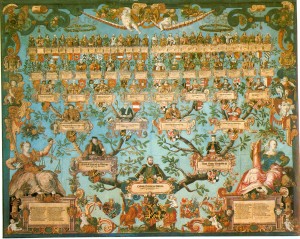How Important is Translation to Genealogy?
By Sarah-Claire Jordan
 Genealogy is the study of family history that includes tracing lineages back to either a specific point in history, or as far back as possible. Everything from interviews and historical records to stories passed down from generation to generation can be used as source material for finding out about a family’s history. It is a field of study based entirely on research, with genetic analysis sometimes being used to verify certain things.
Genealogy is the study of family history that includes tracing lineages back to either a specific point in history, or as far back as possible. Everything from interviews and historical records to stories passed down from generation to generation can be used as source material for finding out about a family’s history. It is a field of study based entirely on research, with genetic analysis sometimes being used to verify certain things.
What does any of this have to do with translation, you might ask? Well, in the U.S. and many other countries, everyone had an immigrant in the family that originally came over from some other country, with the exception of Native Americans and other indigenous peoples. What happens if you are doing a bit of hobby genealogy for your family and you get past the part where your ancestors came over from, say, France? If you are already a French translator, then dealing with the primary sources in French shouldn’t be more than a fun challenge. Others, however, are not translators and need to get in touch with someone who can help them.
What exactly do genealogical translators do?
Other than taking on the rather daunting task of helping a family decipher the mysteries locked inside historical documents written in a foreign language, this type of translator has to do a lot more research than most translators. Many things can come up when documents written out years ago in another language are the focus of study, including:
1. Spelling and grammar issues
Many times, the one person in a family designated to keep genealogical records was only educated enough to be able to read and write, and sometimes just the bare minimum. This means that lots of documents of this type are riddled with spelling mistakes, grammar issues, and more. Even if someone knows a bit of the language and can get the jist of what is trying to be said, it takes a trained translator to know when spelling issues are due to the use of a different dialect, someone spelling out an English word phonetically in their own language, or other factors. Certified translators know when to stop and look something up, and where to look
2. Terms with no English translation or that aren’t used anymore
Yes, even if something has no English equivalent, you will probably want a translator to take a look at it. They are trained to figure out the best way to deal with these kinds of words and most likely have had to find a way to explain the same term in English before. The same goes for obsolete words. If a translator doesn’t know the meaning or translation at the top of their head, they are equipped with the resources to find out.
3. Latin terms and different scripts
Sometimes, a historical document will have a few terms here and there in Latin, or even switch to a different script, like Roman or German. Again, translators that specialize in family history will know how to decipher these words or have the resources to help them do so.
Alpha Omega Translation is a translation company with a huge team of skilled translators. If you do end up needing help with your family history, you can be sure to find a translator who can help you.
For an overview of our translation expertise, visit our website translation and localization page.
Category: Business Translation








